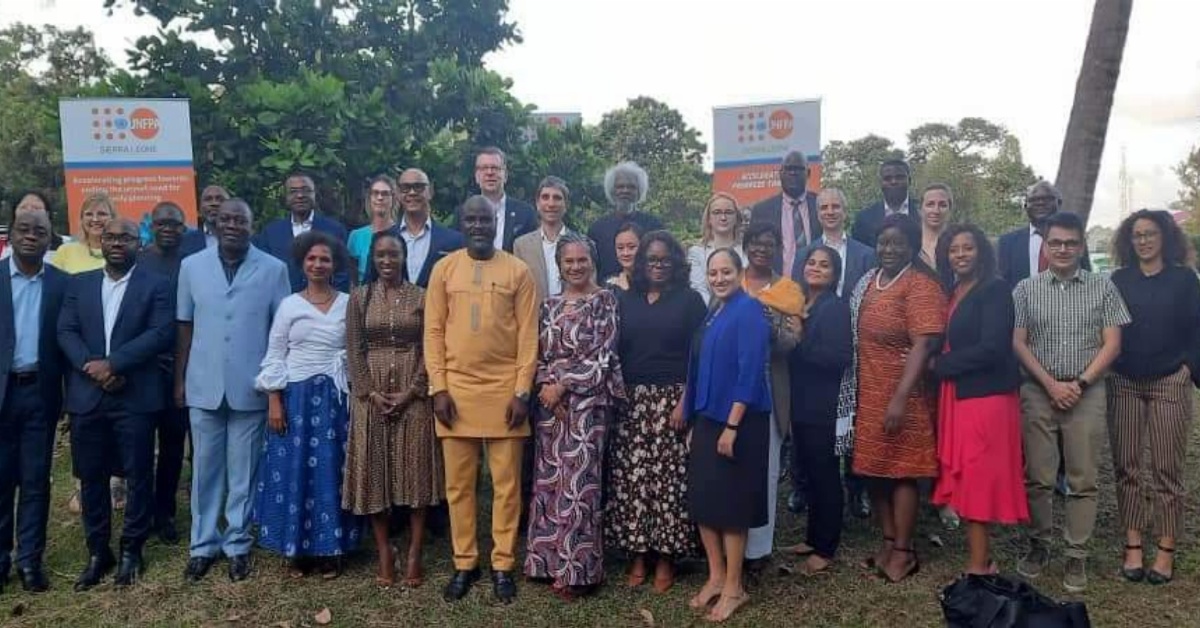The United Nations Population Fund (UNFPA) Sierra Leone this week hosted a high-level delegation from its Regional Office in Dakar and Headquarters in New York led by the Regional Director for West and Central Africa, Ms. Argentina Matavel Piccin, the Director of the Technical Division Dr. Julitta Onabanjo and the Director of the Policy and Strategy Division Mr. Arthur Erken.
The delegation conducted a strategic review of the agency’s programs in West and Central Africa. It examined the status of its transformative results in the region, including opportunities for advancing maternal health and family planning and empowering women and young people.
The review took place from 28-30 November 2022 and brought together experts from across UNFPA offices, including global and regional advisers and six Country Representatives from West and Central Africa, East and Southern Africa and the Arab States, as well as participants from partner organizations. The mission took a deep-dive focus on Sierra Leone and Niger and held discussions with officials from the Ministry of Health and Sanitation as well as development partners in Sierra Leone.
Reflecting on the meeting, UNFPA Regional Director for West and Central Africa, Ms. Argentina Matavel Piccin said that, “The deep dive was long overdue. Like other partners, UNFPA is soul-searching on what innovations and strategies we could contribute to accelerate the reduction of Maternal mortality and improve Family Planning in Sierra Leone. We are encouraged by the very ambitious targets the Ministry of Health and Sanitation of Sierra Leone set to reduce maternal mortality to less than half its current numbers in only three years. It is challenging but doable; because no woman should die giving life.”
Sierra Leone and Niger were selected for the deep-dive exercise given that the two countries face some of the highest maternal mortality rates, child marriage and adolescent pregnancy globally. Sierra Leone is accelerating efforts to reduce its maternal mortality rate of 717 per 100,000 live births to progress towards the SDG target of 70 per 100,000 live births by 2030.
“We, as UNFPA, have done many good things to accelerate progress on maternal health and family planning. However, one lesson is that we need to invest more in demand generation and addressing social norms that put women’s lives at risk and hinder them from achieving their full potential,” remarked Arthur Erken, UNFPA’s Director of Policy and Strategy. He reflected that the visit provided an opportunity to dive deep into progress and challenges in the country and understand why some indicators have shown slow improvement. Sierra Leone, he said, has made enormous progress but there is an opportunity for further improvement in critical areas, including digitalization of data.
UNFPA’s Representative in Sierra Leone, Ms. Nadia Rasheed welcomed the strategic review, stating that “this was an important opportunity to analyse the organization’s work and contributions in Sierra Leone, and to set a corporate vision for accelerating the pace of progress to transform the lives of women and young people.” She noted that UNFPA has been a partner in Sierra Leone since 1971 and has made strong contributions to advancing national development priorities and improving sexual and reproductive health, with a focus on ending maternal deaths, unmet need for family planning and gender-based violence and other harmful practices.
UNFPA provides up to 90 per cent of family planning commodities in Sierra Leone. In 2022, this support enabled nearly 540,000 women to meet their family planning needs, helping to avert more than 200,000 unintended pregnancies, 74,000 unsafe abortions and 1,600 maternal deaths. UNFPA has also helped to train more than 1,400 midwives in the past 12 years to contribute to ending maternal deaths, together with the Ministry of Health and Sanitation and the Government of the United Kingdom.
Credit: UNFPA West and Central Africa (Dakar)



 Post a comment
Post a comment









Comment(s)
Disclaimer: Comments expressed here do not reflect the opinions of Sierraloaded or any employee thereof.
Be the first to comment